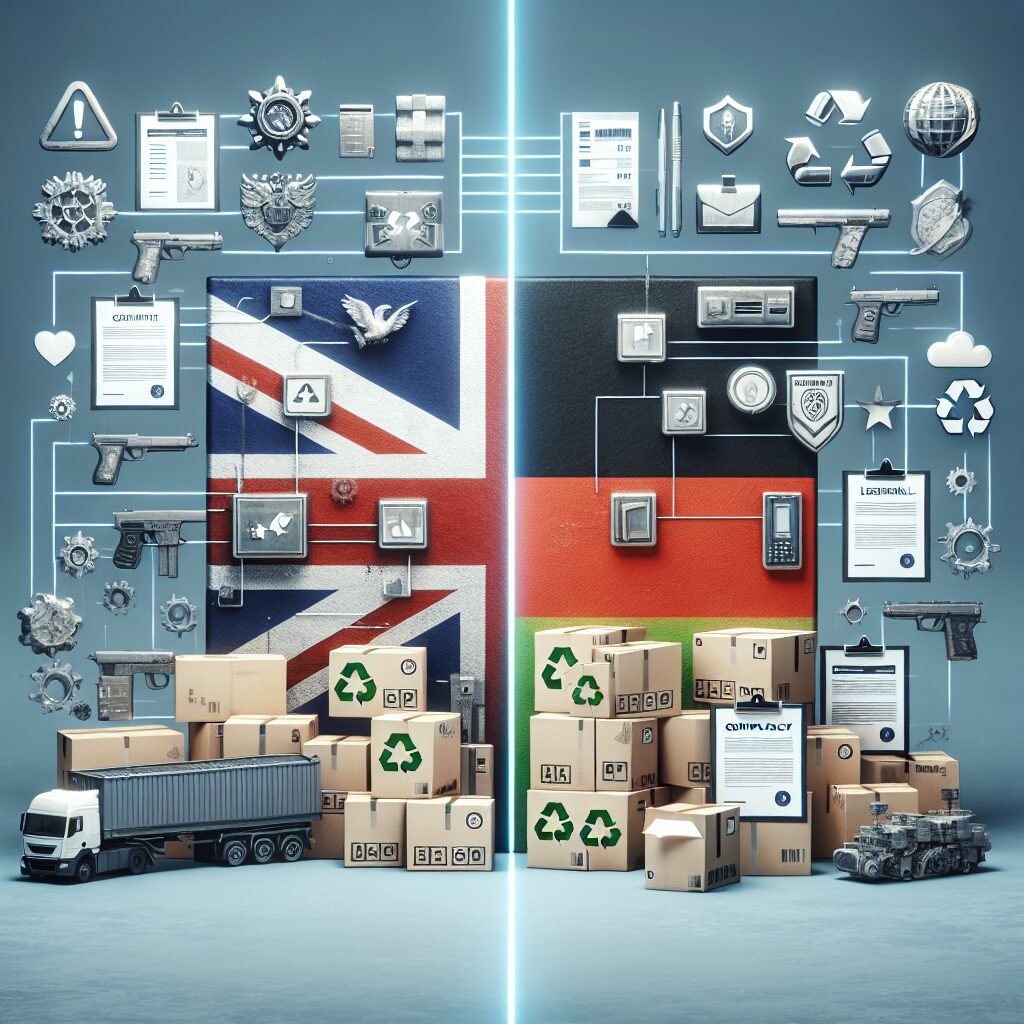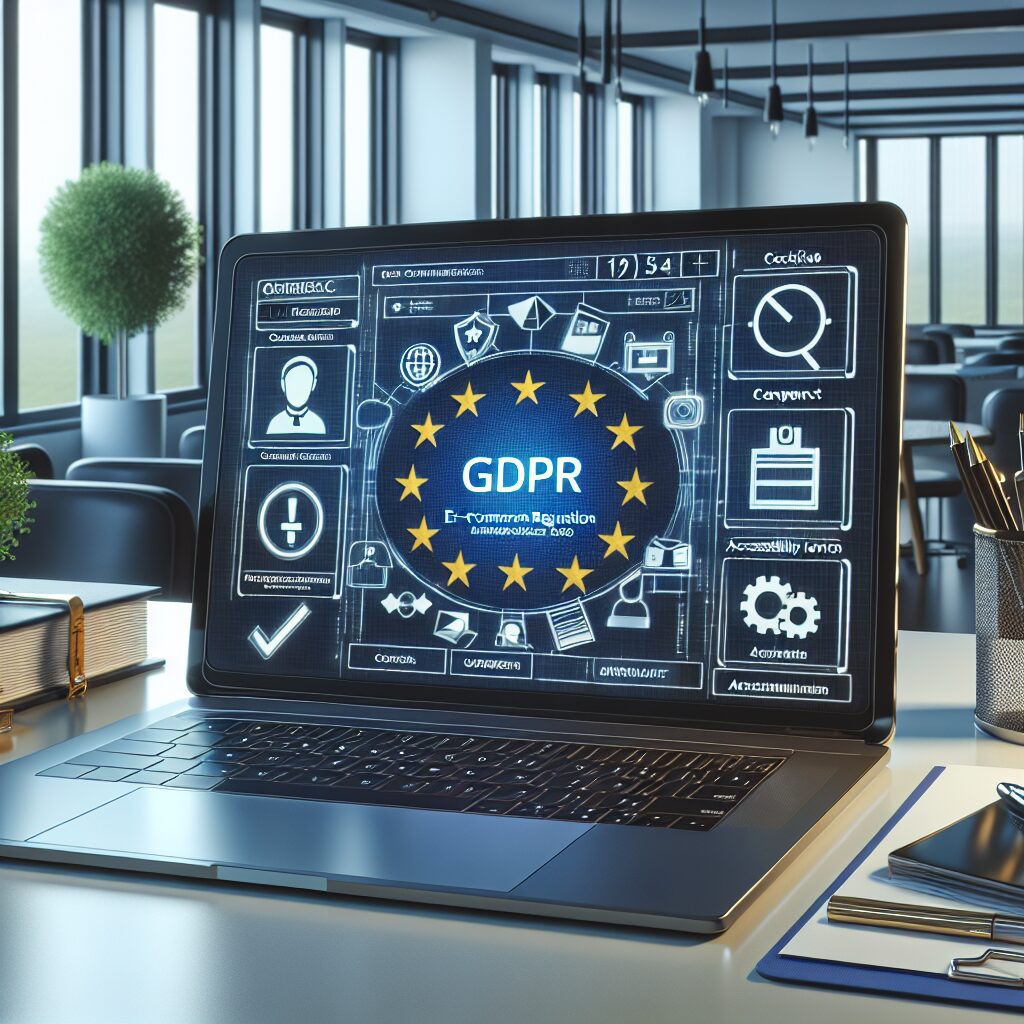About eldris
At Eldris, we automate SEO, multilingual site expansion, and EU compliance for brands scaling across Europe. Our AI-powered platform handles everything from content publishing to regulatory docs—so you don’t have to.
In This Article
- UK packaging compliance involves meeting EPR obligations under 2024 reforms.
- Germany’s VerpackG mandates registration with LUCID and dual system contracts.
- Germany applies no size threshold—every producer must comply.
- UK uses shared responsibility; Germany places full onus on first distributor.
- Reporting intervals and thresholds vary significantly between the two countries.
- Audit-backed declarations are required in Germany for packaging above certain volumes.
- Compliance tools help manage divergent workflows and reporting cycles.
- Common pitfalls include EPR threshold miscalculations and outdated data declarations.
- Cross-border strategies require dual-localisation of compliance policies.
- Upcoming reforms will increasingly link packaging with broader sustainability mandates.
Understanding UK Packaging Compliance in 2024
Overview of UK legal framework and responsibilities
UK packaging compliance refers to a series of regulatory obligations placed on businesses that place packaging on the UK market. As of 2024, this compliance is heavily influenced by Extended Producer Responsibility (EPR) reforms. Businesses are legally required to take full responsibility for the environmental impacts of packaging waste, from production through to disposal. By ensuring UK packaging compliance, companies avoid penalties, promote sustainable practices, and maintain access to both domestic and international markets.

Organisations that handle more than 25 tonnes of packaging annually and have a turnover exceeding £1 million are generally obligated to comply under the Packaging Waste Regulations. The responsibilities include registering with the appropriate environmental agencies, accurately reporting packaging data, and contributing financially to recycling and recovery schemes. New EPR rules also require those responsible for household packaging to cover the full net cost of collection, sorting, and recycling of this waste.
German VerpackG and the LUCID System Explained
Packaging registration and EPR duties under German law
Germany’s packaging compliance is governed by the Verpackungsgesetz (VerpackG), a law enforcing EPR obligations for all producers placing packaging on the German market. A central component of this regulation is the registration with the LUCID Packaging Register—managed by the Central Agency Packaging Register (Zentrale Stelle Verpackungsregister or ZSVR). Every producer must register in LUCID before packaging enters the German stream. Failing to do so can lead to severe consequences including heavy fines and market bans.
Ensuring visibility in the LUCID system is not optional—it’s the legal prerequisite for packaging legality in Germany.
Producers must also participate in a dual system by contracting with a licensed third-party compliance scheme that physically collects and recycles packaging waste on their behalf. They must disclose a breakdown by packaging material type—such as paper, plastic, aluminium, and composite materials—and report packaging volumes both preliminarily and finally each year through LUCID. Importantly, German regulations apply not only to physical manufacturers but also to importers and retailers.
Key Differences: UK vs Germany Packaging Law
Though both nations follow the EPR framework, there are several critical legal differences. In the UK, producer responsibility thresholds are set relatively high, which exempts many smaller businesses. In contrast, Germany’s VerpackG applies to all producers regardless of size or turnover—there’s no minimum threshold. This structural divergence demands that UK firms expanding into Germany reassess their qualification status.
Additionally, the UK allows for mandatory compliance through compliance schemes or self-registration with the environmental regulator (Environment Agency in England, SEPA in Scotland, NRW in Wales, and NIEA in Northern Ireland). Meanwhile, Germany mandates both an individual registration in LUCID and a binding contract with a dual system operator for packaging waste handling.
Another distinction lies in enforcement rigor. Germany relies on the publicly accessible LUCID system for full producer transparency, offering improved market surveillance. In the UK, enforcement activity is less centralised, although increasing scrutiny under the new EPR regime is changing this landscape. Maintaining UK packaging compliance alone does not qualify a business to operate legally in Germany—country-specific compliance is non-negotiable.
How EPR Duties Differ Across Both Markets
The practical implementation of EPR varies significantly. In the UK, EPR extends to obligated producers managing household and non-household packaging waste. Under the Packaging Waste Regulations, producers are assigned shared responsibilities across the supply chain—spread among raw material manufacturers, converters, packer/fillers, sellers, and importers. Each of these actors assumes a proportional obligation for recycling.
Conversely, VerpackG centralises obligation on the initial commercial distributor of a packaged product. This party, whether a manufacturer or importer, bears the total compliance burden. There is no shared responsibility model. Consequently, UK firms exporting packaged goods to Germany must adjust to this transition from partial to full responsibility.
Under UK reform, obligated organisations must also provide packaging recyclability labelling on certain materials from 2026, whereas Germany already enforces stringent packaging identification under EU waste hierarchy directives. This illustrates how EPR duties not only differ in ‘who is responsible’, but also in ‘how compliance is demonstrated’.
Reporting Obligations & Thresholds: Germany vs UK
Reporting schedules form another area of divergence. In the UK, businesses must report data biannually from 2024 to the environmental regulator or through a compliance scheme. Required reporting fields include packaging material type, sales origin, and whether the packaging is household or business-related. Larger organisations—defined as companies handling over 50 tonnes—must submit far more detailed data.
Germany introduces a more immediate reporting framework. Businesses must submit a Declaration of Completeness annually if thresholds (typically >80,000kg glass, >50,000kg paper, or >30,000kg plastic and composite) are exceeded. These declarations must be audited by an authorised verifier. Regular volume declarations—initial and final—are also required, sometimes as frequently as quarterly.
Failure to comply with reporting practices in Germany attracts risk under strict liability principles. The public nature of LUCID means business partners can easily verify registration status, increasing reputational stakes. In the UK, enforcement mechanisms are now being reinforced by mandatory ‘data accuracy’ audits to increase transparency.
Cross-border Compliance Strategies
Establishing streamlined cross-border compliance begins with conducting a full internal packaging audit. UK businesses exporting to Germany—or vice versa—must evaluate packaging volumes, material composition, and delivery mechanisms. Key in this analysis is confirming whether your business qualifies under both UK and German thresholds, as dual reporting may be mandatory.
Engaging local EPR consultants within each jurisdiction can reduce errors and improve cost-efficiency. Businesses should also integrate ERP platforms capable of tracking packaging flows and thresholds across markets. This ensures that reporting data is always accurate and auditable. Establishing internal SOPs that align with both UK packaging compliance schemes and German VerpackG requirements prevents costly duplication of effort.
Companies often benefit from choosing compliance bodies active in both the UK and Germany, as they offer institutional knowledge and multilingual account managers, simplifying communication. Learn more about EU regulatory compliance for product packaging provides additional tools and templates for setting up a dual-market compliance strategy successfully.
Common Pitfalls Brands Must Avoid
One of the most frequent errors is assuming that compliance in one jurisdiction assures legality in the other. UK packaging compliance, while robust, does not meet German VerpackG standards. Similarly, non-German firms often neglect their obligations simply because they use fulfilment partners. This is risky—under German law, the first entity to commercially distribute the product in Germany holds full liability even if based abroad.
Another concern is underreporting material volume. As audits become more widespread, inconsistencies in submitted data bear significant fines. Some businesses also neglect updates—when packaging changes are introduced, reports must be adjusted immediately. Lastly, many firms fail to budget for dual system fees in Germany, which can surpass initial estimates due to higher recycling costs per material class.
Tools and Automation for Simplified Compliance
The complexity of packaging compliance across jurisdictions has spurred technological innovation. Businesses now increasingly adopt digital compliance platforms that integrate product lifecycle tracking with real-time data analytics. Such systems reduce human error, improve accuracy, and support multi-country compliance from a single dashboard.
Solutions exist that automatically categorise packaging material types and calculate the corresponding EPR data across both UK and German frameworks. Several AI-driven platforms can flag anomalies and help synchronise timelines for reporting and registration renewals. Moreover, they generate audit trails needed to demonstrate due diligence in the case of legal inspections.
For SMEs or exporters operating below EPR thresholds, these tools support future scalability by storing templates inline with both UK packaging compliance and German VerpackG reporting. Read a related article explores a selection of cloud-based compliance automation tools tailored for 2024 legislative changes.
Case Study: UK-to-Germany Packaging Journey
Consider the case of a mid-sized UK cosmetics manufacturer launching in the DACH region. Initially compliant only with the UK’s EPR scheme, the company faced hurdles upon entering the German market. It failed to register with LUCID ahead of product distribution and had not formulated a packaging declaration strategy for Germany.
Upon legal consultation, the firm retroactively registered with ZSVR, signed with a dual system, and restructured its ERP systems to account for German-specific material classifications. This retrospective correction was costly and prompted scrutiny from German partners. Yet, once compliant, the business reaped credibility benefits, including faster onboarding with leading retailers and increased press visibility. This evolution underlines the strategic necessity of proactive, bilateral compliance planning.
Regulatory Trends to Watch in 2024–2025
As the UK transitions deeper into full implementation of EPR schemes, further reforms are expected in packaging labelling, digital waste tracking, and variable fee structures based on recyclability. Meanwhile, Germany aims to digitise declaration processes further via integration with EU-wide sustainability reporting frameworks.
Future convergence may emerge through EU-UK regulatory equivalency dialogues, although divergence in enforcement philosophy remains likely. Nearly all experts anticipate additional obligations within supply chain reporting and carbon footprint disclosures tied to packaging. Staying abreast of emerging compliance rules remains imperative—failure to adapt could result in not only fines but forfeiture of market access.
Comparing UK and German packaging rules offers continuously updated insights on both UK and German EPR amendments.
Conclusion: Packaging Smart for Two Jurisdictions
Achieving compliance across UK and German packaging laws is more than a legal box-ticking exercise—it’s a critical component of operational success and brand integrity. By establishing clear procedures, leveraging technology, and staying informed, businesses can navigate complex regulatory frameworks with confidence and efficiency. UK packaging compliance must be tackled alongside German VerpackG rules when operating across borders—failure to do so undermines both environmental progress and commercial potential.
Great guide on uk-germany-packaging-compliance-legal-differences – Community Feedback
What is the main difference between UK and German packaging compliance?
The primary difference is Germany’s stricter Extended Producer Responsibility (EPR) and mandatory registration with its Central Packaging Register, while the UK operates under its own EPR laws and reporting requirements, each with unique reporting thresholds and enforcement.
What documents are required for packaging compliance in Germany?
In Germany, you must register with the LUCID Packaging Register, contract with a dual system for recycling, keep quantity records, and regularly report packaging volumes.
How can businesses ensure full compliance when exporting to both markets?
Businesses should register with both the UK authority and Germany’s ZSVR, understand each country’s packaging categories, meet recycling obligations and reporting deadlines, and consult local experts or platforms like Eldris for automated compliance support.








